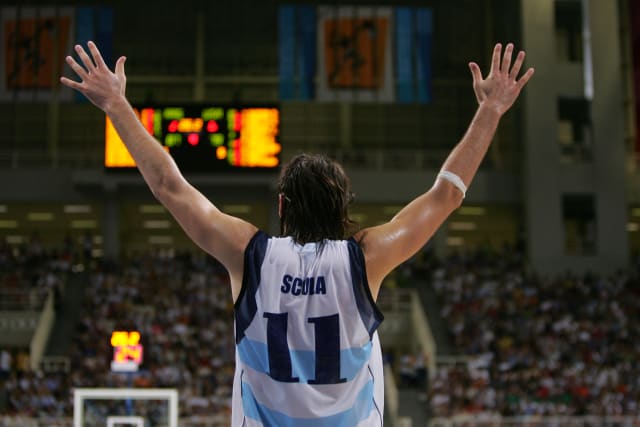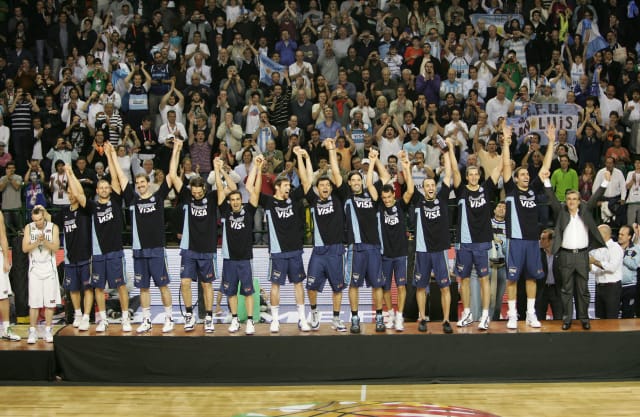A team for the history books
One of the most iconic teams that characterized the FIBA Americas in the past decades has been the Argentine national team, specifically its “Golden Generation.”
One of the most iconic teams that characterized the FIBA Americas in the past decades has been the Argentine national team, specifically its “Golden Generation.” Beyond the results, it was a group able to transcend Argentine basketball, thanks to their selfless game, the commitment of the team members, and the immense talent of every one of them. It was a team that left its mark, with a dynamic, beautiful, aggressive, and generous game. All have acknowledged the Golden Generation's importance. Both at a continental and a world level.
There were two FIBA Americas where the Argentine national team's brightness blinded everyone. First, when the squad was just recently drawing attention to itself (2001). Then, when many of its leading figures were already in their final years with the Argentine jersey (2011). Both events took place in Argentina and concluded with the locals winning the title. If the events' pictures are carefully analyzed, one may notice that several faces that are celebrating in one tournament and the other are the same, with time as their unavoidable witness. Two different teams that are almost the same. It's the parable of the athlete, represented clearly as ever: intensity and vertigo at the beginning, experience, and wisdom when the end is near.
The first great title of the Golden Generation, as was mentioned before, was in August 2001, at the FIBA Americas in Neuquen, where a multitude of fans accompanied the team each step of the way. There, Argentina was overpowering and went undefeated (ten wins in ten appearances). It could already be seen that the team – which was led back then by Rubén Magnano – was ready to reach new heights. Aside from their particular successes (they'd just won the South American Championship in Valdivia) and their outstanding players' feats overseas, the team portrayed an interesting game proposal for the time – an extended bench, several offensive approaches, and an iron-clad defense. You could sense their commitment, unity, and drive. The only rival that could step on their toes was Brazil, at the initial stage, taking Argentina to overtime. But after that, Argentina didn't allow anyone to come close. Even in the final, when they met again with the Brazilians, the Argentines were overpowering (78-59).
 Emanuel "Manu" Ginóbli
Emanuel "Manu" Ginóbli
Emanuel Ginóbli, who was already giving glimpses of his virtuosity, was distinguished as the tournament's MVP. He was just 24: they didn't even know how to say his name in the NBA. That championship at the Ruca Ché Stadium was a preview of what was to come for the Argentine team. Just a year later, in Indianapolis 2002, the Argentines would defeat the undefeated Dream Team (58 won games) and be second in the World.

A decade went by before the South Americans could once again take the first place in a FIBA Americas. It happened in Mar del Plata. The tournament featured many outstanding players that struggled to win the top prize: one of two spots for the London Olympic Games. The event meant bringing back together the Argentine team with their fans after ten years (since Neuquen they hadn't hosted again) and also the comeback of coach Magnano to the country, now as the head coach of the Brazilian squad. Tickets sold out every day. In fact, long before the ball went up in the air, everything had already been sold. The Golden Generation created a huge stir. At the hotel where they were staying, fans were waiting 24/7. The team had to prove in the court the expectations they had created out of it. The pressure was very real. Meanwhile, their rivals couldn't be underestimated: Brazil was a strong team, as were Canada and Puerto Rico. The story had a happy ending.

Although the locals lost against the Brazilians in the initial phase, before and after, the Argentines won all matches and secured the desired London qualification. The semifinal, which granted the Olympic ticket, was against Puerto Rico, with an unforgettable conclusion in which José Juan Barea had a winning shot and missed (the game ended 81-79). And in the final, the men led by Julio Lamas decided to avenge their first game against Brazil (the other team that qualified to the Olympics) and defeated them 80 to 75. Luis Scola (32 points) was named MVP for the third FIBA Americas in the row, confirming his absolute dominance at a continental level and his role as the undisputed leader of the national team. That was the Argentines’ last title in the competition.
Is it their turn to win again in 2021? The numbers say it is.
German Beder
FIBA